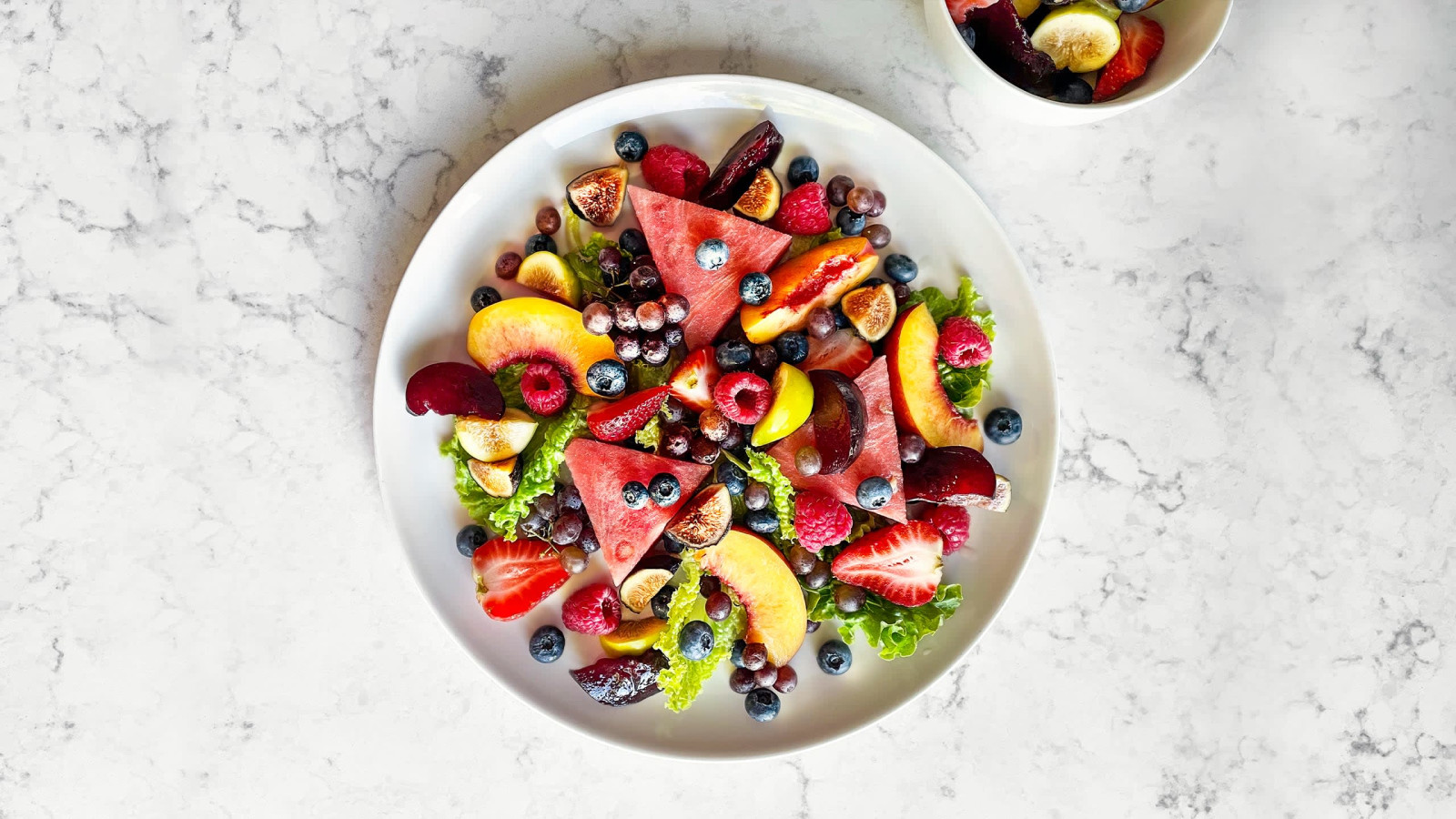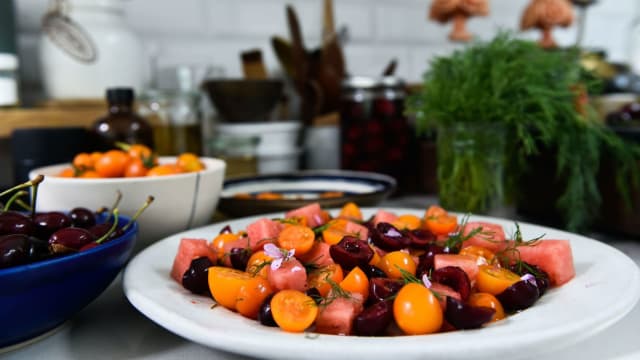Nutritional Power of Fruit

Always succumb to the temptation of fruit. It’s not only delicious and refreshing but packed with essential nutrients beneficial for our health and wellbeing. With its array of vitamins, minerals, antioxidants, and dietary fiber, fruit is an important part of a balanced diet. And vastly preferable to processed or sugary foods when it’s snack time.
Nutritional Profiles of Fruit
Fruit’s varied and vibrant colors speak not only to their visual diversity, but also to distinctive nutrition. Citrus fruits like oranges and grapefruits are excellent sources of vitamin C, boosting the immune system and promoting healthy skin. With its high water content, fruit also helps keep you hydrated.
Antioxidant-rich berries, including strawberries, blueberries, and raspberries, protect the body against free radicals, inflammation, and reduce the risk of chronic diseases. Bananas are packed with potassium, an electrolyte that helps maintain proper heart and muscle function. Apples and pears are high in dietary fiber and pectin, which aids digestion and promotes satiety, and in the bioactive quercetin which helps reduce oxidative stress and inflammation.
“Getting to know the names of the specific phytonutrients in fruits can help us become more mindful of their corresponding health benefits. In addition, it is especially important to consume the peels when possible as this is where the richest source of phytonutrients are concentrated,” says Keri Romerdahl, Director of Nutrition, Roundglass.
What Is the Right Way to Eat Fruit?
To maximize the health benefits of fruit, eat it in its natural form: fresh and whole. While there is concern regarding diabetics and fructose, health professionals and nutritionists agree that they can consume whole fruits in moderation. Eating fruit whole, thanks to its fiber content, provides a slower release of sugars into the bloodstream and helps maintain steady blood sugar levels, even for diabetics.
Not all fruit is created equal when it comes to sugar content and blood sugar balance. Another strategy to keep in mind to offset some of the high sugar content in fruit, which can spike your blood sugar, is to pair it with healthy fats and protein. Serve apples or bananas with nut butter and seeds, add berries to your Greek yogurt, or blend fruit in a smoothie with greens, yogurt, and/or nuts and seeds. You can also add fruit to your vegetable salads to help offset potential blood sugar spikes.
Light exercise can help, too. A 10-minute walk or tackling a few household chores right after eating higher sugar content fruit helps maintain blood sugar balance.
Consider the glycemic index (GI), and be mindful of how it impacts your blood sugar balance. Limit higher GI fruits (>65) and keep in mind the above strategies; low GI fruits can be consumed more frequently.
Fruit As a Snack
An easy way is to opt for fruit like a whole apple or banana as a midday snack. Craving dessert? Help yourself to a bowl of mixed berries. Dried fruit, removed of its water content, results in a condensed snack that is still nutrient-rich. Be mindful of portion sizes, as dried fruit is more calorie-dense than fresh.
Smoothies: Convenient and delicious, smoothies are a great way to get a few different fruits at once, providing a concentrated dose of nutrients. Always add some healthy fats, protein, and fiber to your fruit smoothies to maintain blood sugar balance. Nuts and seeds are great options!
Fruit Salads: Like making a smoothie, mix and match whatever you have on hand. And don’t be afraid to add leafy greens!
Juices: Freshly-squeezed juices provide a concentrated source of vitamins and minerals. However, juices can be high in natural sugars; moderation is key. Tip: Make juices at home so you can preserve the fiber content of each fruit.
What is the Optimum Amount of Fruit to Consume in a Day?
The recommended daily intake of fruit varies depending on factors such as age, sex, and activity level. In general, try eating 2-4 servings of fruit a day. How much fruit is in a serving? It can be a medium-sized whole fruit, a cup of sliced fruit, or a handful of berries. With so many options, it’s easy to meet your nutritional goals.
What is The Best Way to Store Fruit?
Most fruit is best kept at room temperature, away from direct sunlight. Put apples in the crisper drawer of your fridge to prolong their freshness. Refrigeration also extends the shelf like of more delicate fruits like berries and grapes. (Be sure to wash fruit before eating to remove any dirt or pesticide residue.) To prevent nutrient loss and oxidation, avoid cutting or peeling fruit until you are ready to eat it. And don’t forget your freezer! If you’re planning on freezing fresh fruit, it’s best to do so sooner than later as freezing helps preserve its nutritional content.
Fruit for Mental Wellbeing
Fruit plays a significant role in promoting mental wellbeing and managing various psychological conditions. Karen R. Koenig, author, and expert on the psychology of eating says, “When we eat fruits, we feel we’re doing something positive and healthy for ourselves. It makes us proud to be nourishing our minds and bodies while having a delicious experience. What other foods are so versatile, nutritious, and enjoyable?” Snacking on fruit could help with:
Stress and Anxiety: Blueberries, bananas, and citrus are rich in vitamin C, which can help reduce stress hormone levels and promote a sense of calmness. Fruit’s natural sugars give a quick burst of energy and can help alleviate anxiety symptoms.
Depression: Fruits particularly high in antioxidants can help combat oxidative stress and inflammation, both linked to depression. Blueberries, strawberries, and oranges are mood-boosting and may reduce symptoms of depression in some people.
Sleep: Tart cherries and kiwis are rich in melatonin, a hormone that regulates sleep-wake cycles. Consuming them, or their juices, before bedtime may improve sleep quality and duration.
Building Focus: With their lower glycemic index, kiwis, oranges, and berries provide a steady release of energy, sustaining focus and concentration throughout the day. The antioxidants in these fruits also support brain health and cognitive function.
What Fruit Adds to Your Cooking and Plate
“In India a fruit like mango is versatile and offers many options from pickles to stews to salads,” says Roundglass teacher Eeshan Kashyap. Cooking with fruit and pairing it with both sweet and savory dishes can offer numerous benefits.
Try this nutritious Spicy Mango & Bean Sprout Salad by Eeshan Kashyap
Flavor Enhancement: The natural sweetness, tanginess, and acidity of fruit can balance savory dishes or add a touch of brightness to sweet treats.
Texture and Moisture: Fruit brings welcome texture and moisture to dishes, providing juiciness to meats, tenderness to baked goods, and a refreshing crunch to salads.
Versatility: Fruit is incredibly versatile and can be used in a variety of dishes. Whether cooked, baked, grilled, blended, or used raw, there’s a whole world of culinary creations.
Gluten-Free Enhancements: For people with gluten sensitivities or celiac disease, fruit provides texture to gluten-free baked goods and can act as a base for gluten-free sauces and dressings.
Vibrant Color: Use fruit as a garnish to elevate the overall presentation of your meals.
Incorporating a variety of fruit into your daily diet can have a profound impact on your physical and mental wellbeing. Whether consumed as a snack, in salads, smoothies, or as a dessert, fruit offers a delicious way to nourish your body and enhance your overall health. Make fruit a colorful and nutritious part of your daily routine.
This mixed berry cobbler by Shenari Freeman adds a vegan fruity punch.
The Benefits
- Fruit is a nutritious and delicious addition to our diets
- Fruit is a source of essential vitamins, fiber, and antioxidants
- Fruit is good for hydration and building immunity









